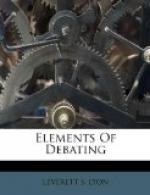incidents were, and how harrowing its consequences.
Sir, I admit it all; I will not combat the correctness
of the picture; and yet if I differ with the gentlemen
who drew it, it is because, had the conception
of the Rebellion been still more wicked, had its incidents
been still more terrible, its consequences still more
harrowing, I could not permit myself to forget
that in dealing with the question now before us
we have to deal not alone with the past, but with
the present and future of this republic.
What do we want to accomplish as good citizens and patriots? Do we mean only to inflict upon the late rebels pain, degradation, mortification, annoyance, for its own sake; to torture their feelings without any ulterior purpose? Certainly such a purpose could not by any possibility animate high-minded men. I presume, therefore, that those who still favor the continuance of some of the disabilities imposed by the Fourteenth Amendment do so because they have some higher object of public usefulness in view, an object of public usefulness sufficient to justify, in their minds at least, the denial of rights to others which we ourselves enjoy.
What can those objects of public usefulness be? Let me assume that, if we differ as to the means to be employed, we are agreed as to the supreme end and aim to be reached. That end and aim of our endeavors can be no other than to secure to all the States the blessings of good and free government and the highest degree of prosperity and well-being they can attain, and to revive in all citizens of this republic that love for the Union and its institutions, and that inspiring consciousness of a common nationality, which, after all, must bind all Americans together.
What are the best means for
the attainment of that end? This, Sir,
as I conceive it, is the only
legitimate question we have to decide.
APPENDIX III
A TYPICAL COLLEGE FORENSIC
The forensic which follows is the one which was used by the State University of Iowa in its debates with the University of Wisconsin and the University of Minnesota in 1908. In the form in which it appears here it was given in a home contest a few evenings before the Inter-State Debate. It is quoted here with the permission of the Forensic League of the State University of Iowa.
Resolved, That American Cities Should Adopt a Commission Form of Government.
Mr. Clarence Coulter, the first speaker on the Affirmative, said:
It is not my purpose to picture the shame of American cities; that is well known; but I am to consider only those evils due to the present form of municipal government, an organization based on the separation of the powers into the legislative, executive, and judicial departments. The proper remedy for these evils will be secured only by adopting a form which concentrates the entire




